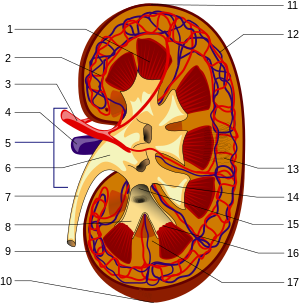 Image via Wikipedia
Image via WikipediaThe kidneys and associated organs that collect, store, and eliminate urine are collectively called urinary system. Urine is a liquid that contains toxic body wastes.
The kidneys dispose of toxic wastes such as ammonia, urea, and uric acid; excess ions like sodium, potassium, and chloride; and excess water in the form of urine. If these substances are not eliminated from the body, these will cause disease and death.
As the heart pumps the blood, the kidneys monitor the quality of blood. At the same time, the proper volume and composition of its body fluids is maintained. The kidneys are also largely responsible for maintaining the water balance of the body and the acidity (pH) of the blood.
Kidneys also play an important role in other body activities. They release the protein erythropoietin which stimulates the bone marrow to increase the formation of red blood cells. They also release vitamin D, which stimulates intestinal absorption of calcium, and helps to control blood pressure. Some drugs or their breakdown products are eliminated through the kidneys.


No comments:
Post a Comment